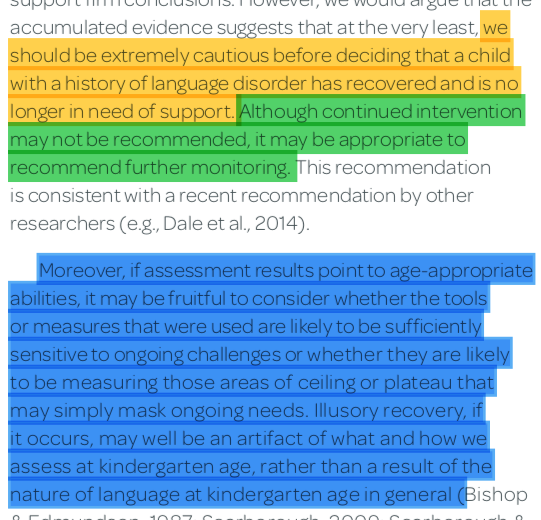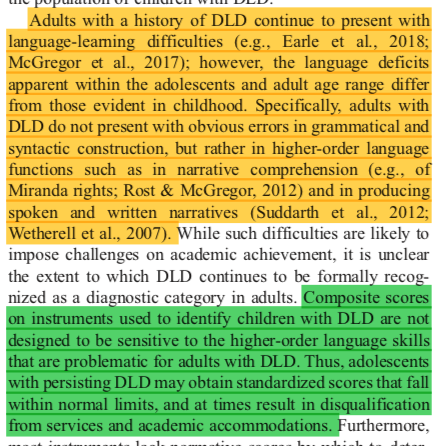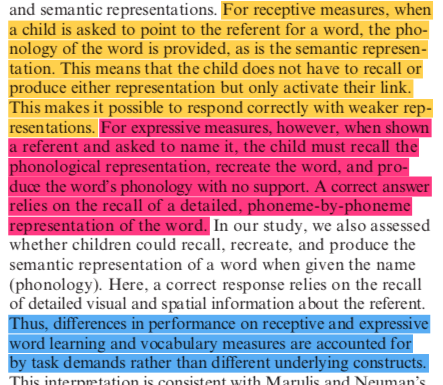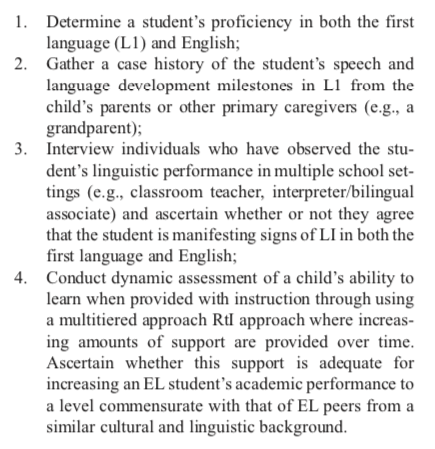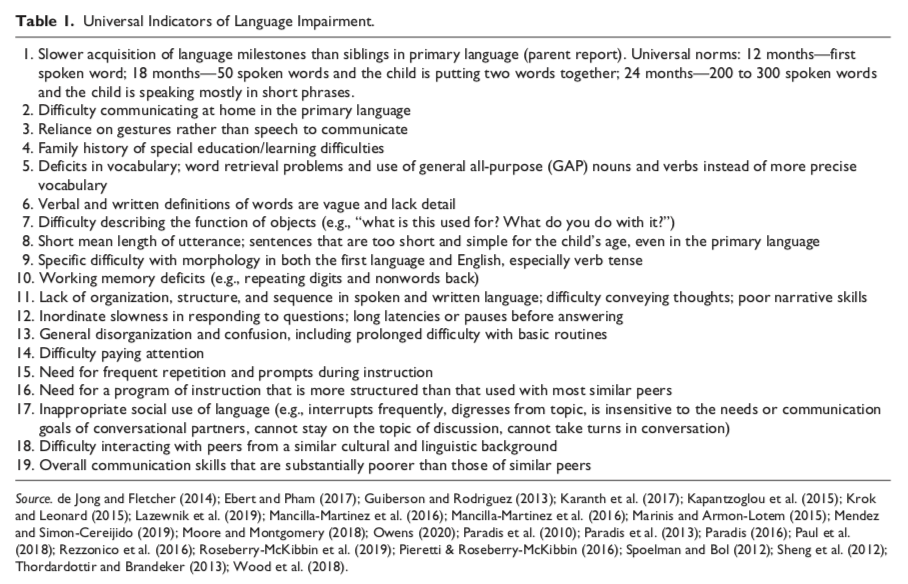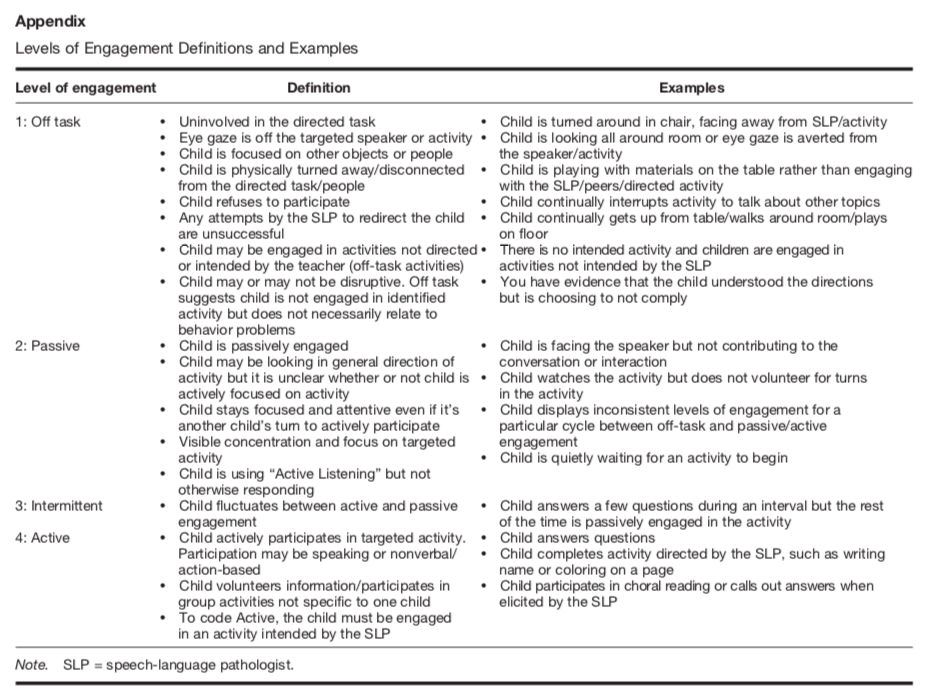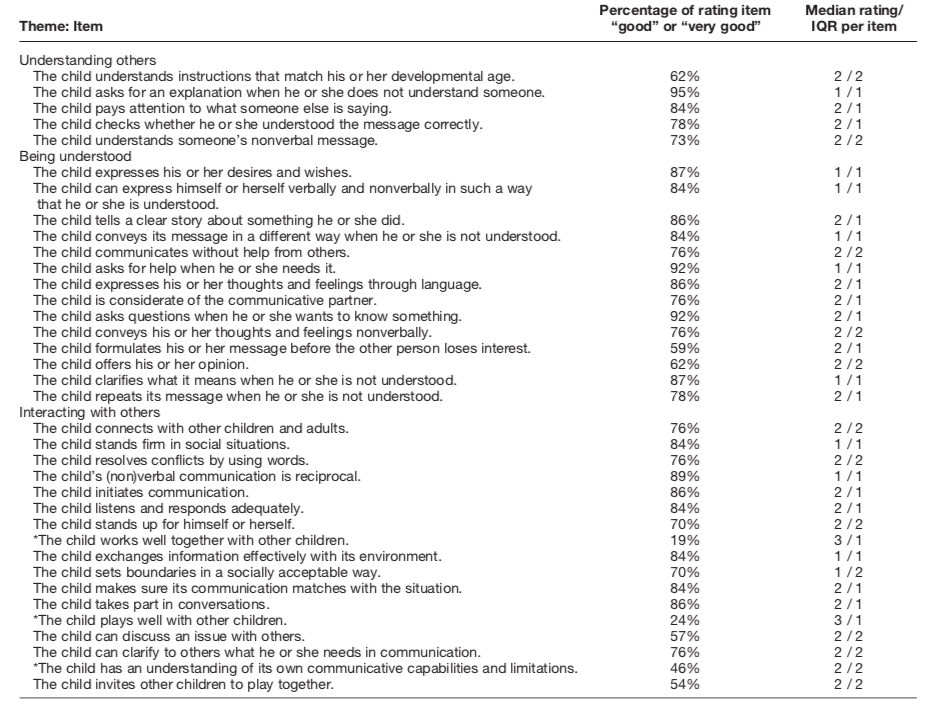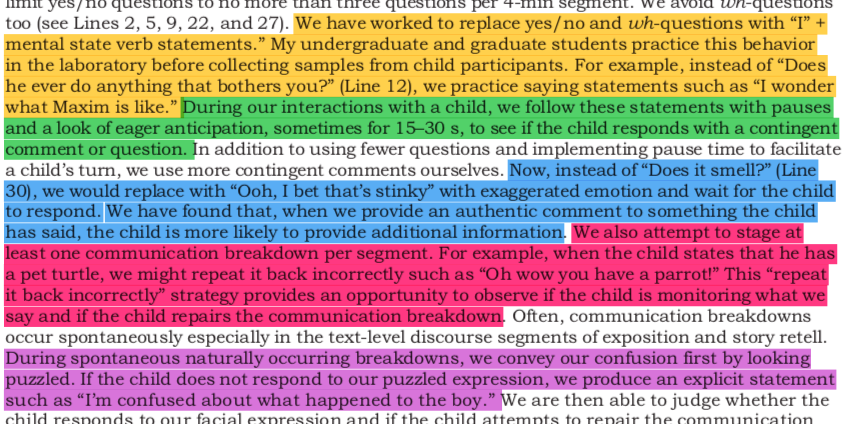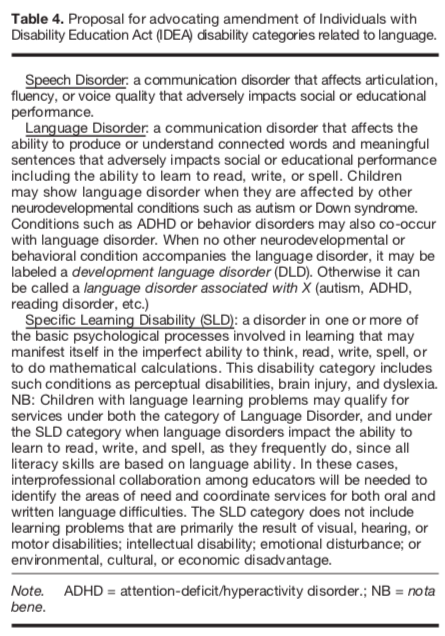Beginning my annual course updating with this gem! @SuzAdlof & @tiffanyphogan call for screening of oral language in school age children in RTI framework. Excellent read!
If We Don’t Look, We Won’t See: Measuring Lang. Dev. to Inform Literacy Instruction https://journals.sagepub.com/doi/full/10.1177/2372732219839075#articleShareContainer
If We Don’t Look, We Won’t See: Measuring Lang. Dev. to Inform Literacy Instruction https://journals.sagepub.com/doi/full/10.1177/2372732219839075#articleShareContainer
Fascinating read from @tiffanyphogan
@CattsHugh
@CrystleAlonzo
Predicting Dyslexia in Children With #DevLangDis https://pubs.asha.org/doi/10.1044/2019_JSLHR-L-18-0265#.XwSUux38bbU.twitter
@CattsHugh
@CrystleAlonzo
Predicting Dyslexia in Children With #DevLangDis https://pubs.asha.org/doi/10.1044/2019_JSLHR-L-18-0265#.XwSUux38bbU.twitter
Alonzo et al. (2019) found that some children with #DevLangDis and early poor phonological processing go on to have good word reading. Letter identification can help identify those with greater risk for dyslexia.
This paper, Best practice guidelines for communicating to parents the diagnosis of disability, was a fantastic read. Unfortunately, I could not find an open access version, but I will highlight some of the points. https://www.sciencedirect.com/science/article/abs/pii/S0378378219304797
There is a medical and ethical imperative to inform parent's of their child's diagnosis. Clinicians need specific skills to support parents through this process. Two stages: giving the diagnosis & supporting parent in their response.
Stage 1: SPIKES protocol
SET up interview
Consider family's PERCEPTION
Obtain family's INVITATION
Give KNOWLEDGE to family
Address EMOTIONS
STRATEGY & SUMMARY
SET up interview
Consider family's PERCEPTION
Obtain family's INVITATION
Give KNOWLEDGE to family
Address EMOTIONS
STRATEGY & SUMMARY
Parents are looking for positive information in the midst of hearing about the diagnosis and realistic prognosis. Be ready to listen & respond to questions. Be clear & certain, provide information in writing & follow up meeting. Involve family in treatment plan.
Most parents feel that they never have enough information.
Access to information is important for parents so they can become knowledgeable & empowered to take control of their lives. Parents want equal and cooperative relationships with clinicians.
(The authors of this best practice guideline are unclear to me, but thanks goes to them!)
(The authors of this best practice guideline are unclear to me, but thanks goes to them!)
Just reading Bowles et al., LSHSS, 2020. Their Narrative Assessment Protocol-2 for 3-6 yr olds is freely available with training at:
http://www.narrativeassessment.com/
I think their training could provide some clinical hours for #SLP2B who have lost clinical time d/t pandemic.
http://www.narrativeassessment.com/
I think their training could provide some clinical hours for #SLP2B who have lost clinical time d/t pandemic.
Charest et al. review hypothesis related to illusory recovery in language disorder, and conclude caution is warranted.
https://cjslpa.ca/files/2019_CJSLPA_Vol_43/No_1/CJSLPA_Vol_43_No_1_2019_MS_1147.pdf
https://cjslpa.ca/files/2019_CJSLPA_Vol_43/No_1/CJSLPA_Vol_43_No_1_2019_MS_1147.pdf
Del Tufo & Sayako Earle (don't think either of twitter) make some great points in this article on skill profiles in #DevLangDis & dyslexia in college students. https://journals.sagepub.com/doi/abs/10.1177/0022219420904348?journalCode=ldxa
Del Tufo & Sayako Earle: Core deficit over lifespan is relatively stable in dyslexia but changes in DLD, so assessment measures need to change for #DevLangDis with age (but not so much the case for dyslexia).
Del Tufo & Sayako Earle: High school students who stop receiving accommodations may think they don't need any when they get to college. College requires self-identification & documentation of diagnosis, which might be challenging for #DevLangDis given services for this age range.
Del Tufo & Sayako Earle: Adults with a history of DLD will have difficulty with higher-order language functions (and probably aren't making obvious grammatical/syntactical errors).
Self-generated strategies improve WM performance with increased detail & sophistication of strategies modulating improvement. Manipulation (e.g., grouping, semantics, imagery) was considered more sophisticated than maintenance (e.g., rehearsal). https://www.sciencedirect.com/science/article/pii/S0749596X19300968
Also Felleman et al: Working memory training leads to adoption of strategies specific to the trained task, leading to improvements on trained tasks & untrained variants.
--> Intervention needs to target problematic tasks specifically.
--> Intervention needs to target problematic tasks specifically.
The great @ShelleyiGray, @tiffanyphogan, @NelsonCowan1 & colleagues provide evidence for phonological & semantic aspects of early word learning. Separate receptive & expressive factors were not observed. https://pubs.asha.org/doi/abs/10.1044/2020_JSLHR-19-00186#.Xwihr7FQ94E.twitter
Gray et al. explain why we often observer better performance on receptive than expressive vocabulary measures in terms of task requirements and robustness of underlying phonological & semantic representations.
I enjoyed this paper by @PennyPexman & team on teaching sarcasm to 5-6 y.o. TD children with low sarcasm scores. Improvements in detecting sarcasm, speaker belief & intent, but not humour. Materials provided in open science site ( http://osf.io/fe8p9/ ). https://psyarxiv.com/rms7h/
Plante & team report no differences in outcomes from Enhanced Conversational Recast intervention whether dose delivered in 15 (1.6 recasts/min) or 30 min (0.8/min).
Maximizing Treatment Efficiency in DLD: Positive Effects in Half the Time https://pubs.asha.org/doi/10.1044/2019_AJSLP-18-0285#.Xw5X2sSeQIo.twitter
Maximizing Treatment Efficiency in DLD: Positive Effects in Half the Time https://pubs.asha.org/doi/10.1044/2019_AJSLP-18-0285#.Xw5X2sSeQIo.twitter
Roseberry-McKibbin considers 4 pre-assessment tasks important for differentiating language disorder and difference in English Learners.
https://journals.sagepub.com/doi/10.1177/1525740119890314 ($)
https://journals.sagepub.com/doi/10.1177/1525740119890314 ($)
Roseberry-McKibbin also provided this list of universal indicators of language impairment, which I found really interesting!
Schmitt (2020) reports a relationship between children's active engagement and gain in public school language therapy. Considered 4 levels of engagement. http://pubs.asha.org/doi/abs/10.1044/2020_AJSLP-19-00157
Singer & Bashir provide a thorough, detailed, and evidence-based review of WM strategies.
Wait…What??? Guiding Intervention Principles for Students With Verbal Working Memory Limitations https://pubs.asha.org/doi/10.1044/2018_LSHSS-17-0101#.Xw59Tolg87Q.twitter
Wait…What??? Guiding Intervention Principles for Students With Verbal Working Memory Limitations https://pubs.asha.org/doi/10.1044/2018_LSHSS-17-0101#.Xw59Tolg87Q.twitter
Singer et al (2020) - Consensus: Communication participation is understanding & being understood in a social context, by applying verbal & nonverbal communication skills. Operationalized in a list of 36 skills.
https://pubs.asha.org/doi/10.1044/2020_JSLHR-19-00326
https://pubs.asha.org/doi/10.1044/2020_JSLHR-19-00326
The great @hstorkel & team replicate 36 exposures during interactive book reading improves immediate-post word learning in #DevLangDis, but substantial forgetting within days. Need to monitor & review! https://pubs.asha.org/doi/10.1044/2019_LSHSS-VOIA-18-0131#.Xw8nw-HK38Y.twitter
Also, @hstorkel found no effects of dose x dose frequency (delivered words 4 times in 9 sessions, also 9x4, 6x6). Sufficient exposure resulted in adequate encoding at immediate post. But quick forgetting after treatment. Considering this now! Thanks for this great work, Holly!
Here's a great article by @GeralynTimler on using language sample analysis to assess pragmatic skills
https://pubs.asha.org/doi/10.1044/persp3.SIG1.23
Love her tips on eliciting the sample. Might use the practice exercise in #WesternDLD2 this year!
https://pubs.asha.org/doi/10.1044/persp3.SIG1.23
Love her tips on eliciting the sample. Might use the practice exercise in #WesternDLD2 this year!
Did you know that the Adams et al's Targeted Observation of Pragmatics in Children’s Conversations is available for download? Thanks @GeralynTimler
for this top too, and the Adams team for making it available!
http://research.bmh.manchester.ac.uk/scip/topicc.pdf
for this top too, and the Adams team for making it available!
http://research.bmh.manchester.ac.uk/scip/topicc.pdf
Love @swardtherapy & @KJSLP's approach to intervention for executive functions. In this paper, they describe their 'Get Ready-Do-Done' intervention model with pictures. Thanks!
A Clinical Model for Developing Executive Function Skills https://pubs.asha.org/doi/abs/10.1044/lle21.2.72#.Xw9Nsw3t_Xk.twitter
A Clinical Model for Developing Executive Function Skills https://pubs.asha.org/doi/abs/10.1044/lle21.2.72#.Xw9Nsw3t_Xk.twitter
Ward & Jacobsen quoting Barkley: 'In order to develop or rehabilitate EF skills, individuals 'need to repeatedly practice: self-monitoring, self-stopping, seeing..., saying..., feeling the future, and playing with the future so as to effectively 'plan and go' toward that future'.
Al Otaiba & Fuchs (2006) Who Are the Young Children for Whom Best Practices in Reading Are Ineffective?
With a high quality, evidence-based curriculum, 7% of K-gr.1 were nonresponsive. Responders never developed reading difficulty (followed to gr. 3) https://journals.sagepub.com/doi/abs/10.1177/00222194060390050401#articleShareContainer
With a high quality, evidence-based curriculum, 7% of K-gr.1 were nonresponsive. Responders never developed reading difficulty (followed to gr. 3) https://journals.sagepub.com/doi/abs/10.1177/00222194060390050401#articleShareContainer
Oh wow, Binger et al (2020) talk about the importance of targeting grammar in AAC as a means to developing linguistic competence. I see a #WesternDLD2 final project here!
Tracking Early Sentence-Building Progress in Graphic Symbol Communication https://pubs.asha.org/doi/10.1044/2019_LSHSS-19-00065#.XxBkdn43ZCU.twitter
Tracking Early Sentence-Building Progress in Graphic Symbol Communication https://pubs.asha.org/doi/10.1044/2019_LSHSS-19-00065#.XxBkdn43ZCU.twitter
Heilmann, Malone & @MWslp characterized persuasive discourse in typically developing adolescents as short (av. 29 c-units), with long sentences (15+ words) & 11% errors. Performance related to language & working memory measures. https://pubs.asha.org/doi/10.1044/2019_LSHSS-19-00078#.XxCc5qwsPPQ.twitter
Heilman et al: Protocol for gathering persuasive sample is provided in the appendix. Authors recommend gathering samples for more topics to when greater sample length is needed.
Rhea Paul (2020) proposes these category definitions for DLD & Specific Learning Disability. At some point, I'm going to take up this topic in the #DLDToolbox
https://pubs.asha.org/doi/10.1044/2019_PERS-SIG1-2019-0012
https://pubs.asha.org/doi/10.1044/2019_PERS-SIG1-2019-0012
This great team: @mcgregor_karla
@TELLlab @tiffanyphogan
@lfinestack & Lisa Goffman address the dimensionality of #DevLangDis by emphasizing CATALISE definition of DLD as language impairment WITH functional impact. https://pubs.asha.org/doi/10.1044/2019_PERSP-19-00083
@TELLlab @tiffanyphogan
@lfinestack & Lisa Goffman address the dimensionality of #DevLangDis by emphasizing CATALISE definition of DLD as language impairment WITH functional impact. https://pubs.asha.org/doi/10.1044/2019_PERSP-19-00083
@threadreaderapp please unroll

 Read on Twitter
Read on Twitter

